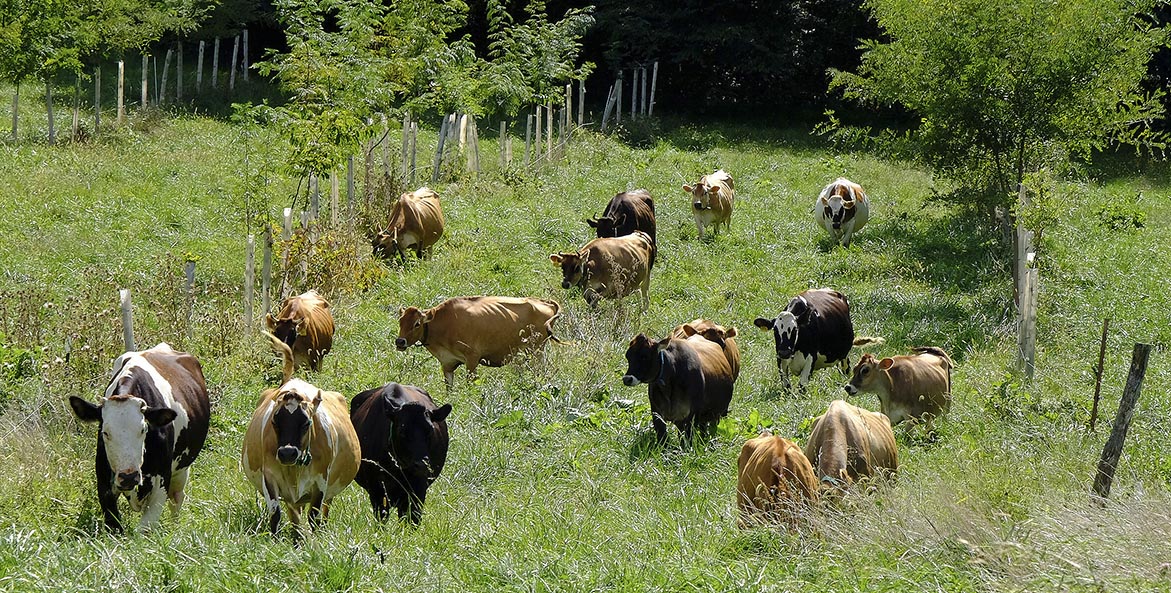This was originally published as a guest essay by Kristen Heberling Hoke in the PA Environmental Digest on July 31, 2023.
Growing up on a dairy farm in Cumberland County has given me fond memories of feeding calves, wandering in the pastures, the rhythm of agriculture, and watching my father work with nature and against it because we couldn’t control the weather.
There was always energy around the farm, especially during hay season, knowing that if rain was coming, we had a short window of time to get the crop harvested. My brother-in-law now manages the acres as our third-generation farmer.
Farm life connected me to nature and stewardship and is the foundation for my job as a restoration specialist working with farmers in Cumberland and Franklin counties, leveraging federal dollars so they can install more pollution reduction practices on their lands.
I’ve seen first-hand that farmers are willing to invest their time, land, limited funds, and effort to clean and protect local rivers and streams. But they cannot do it alone. It will take greater and long-term investments of financial and technical resources at the state and federal levels to reach the amount of pollution reductions needed from agriculture.
The 2023 Farm Bill provides a unique opportunity to direct vital federal resources to farms in Pennsylvania to help achieve water quality goals and provide economic benefits on and beyond the farm.
In Pennsylvania all farms are required to have erosion and sediment control plans for tilling acreage, and a manure management plan if they have animals. Some farmers have trouble keeping up with those requirements because there aren’t enough technical service providers to help update the plans or make sure they are accurate and being followed. So, developing/writing those plans can be delayed and implementation may never happen.
Another barrier is that, since the pandemic, construction costs have remained high and many farmers have had to cancel contracts or alter what they were planning to do because they could not afford to complete their projects. Construction costs could still be 30 percent higher than they were pre-pandemic.
In many cases, out of concern for the resource, applications from farms with streams often get higher priority for funding through the Environmental Quality Incentives Program (EQIP) and others. This often creates waiting lists.
When farmers install a riparian buffer through the Conservation Reserve Enhancement Program (CREP), we can offer them additional funding to offset the cost of other practices like manure storage and fencing to keep animals out of a stream which can keep livestock healthier in addition to protecting water quality.
Improving soil health is another important priority for many farmers. In the next Farm Bill, it would help if Congress increased support for practices that help sequester carbon, improve soil health and its capability to retain moisture, and the planting of more trees. It could do this by changing existing programs like EQIP, Federal Crop Insurance Program, and Conservation Stewardship Program, to increase incentives and technical assistance for regenerative agriculture.
Regenerative agriculture includes growing compatible crops together, planting cover crops, rotating where crops grow and animals feed, and others that help build the health of the soil and surrounding waterways.
In the next Farm Bill, Congress should also reinvigorate CREP by removing barriers to enrollment, allowing states like Pennsylvania to easily take advantage of legislative improvements, and improving incentives for landowners. Land eligible for CREP should be expanded to include cropland, marginal pastureland, grasslands, and other rural lands that have a positive impact on water quality and have a riparian buffer.
The new Farm Bill should also expand a successful third-party pilot program under CREP that simplifies the process of designing, installing and maintaining riparian forest buffers.
Consideration should also be given to improving the Regional Conservation Partnership Program, increasing support for historically underserved farmers, and developing and maintaining a qualified and diverse community of conservation professionals.
As part of a farming family and working with farmers, I know that investments in the family farm can improve the bottom line, protect herd health, and reduce polluted runoff that harms local waters.
Urge Congress to Pass a Bay-Friendly Farm Bill!
Take Action
Kristen Heberlig Hoke is a Chesapeake Bay Foundation restoration specialist in southcentral Pennsylvania. She lives in Cumberland County.



